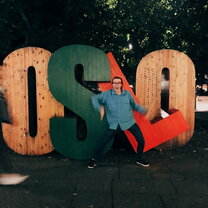
The Ultimate Guide to Studying Abroad in Norway
Your comprehensive guide to studying abroad in Norway, including budgeting advice, the most popular cities for students, and top-rated programs
When you think of the "quintessential study abroad" experience, it's likely that Norway isn't the first nation that pops into your mind. What better reason to go there and have a unique experience?
There's absolutely nothing wrong with deciding on a more traditional study abroad destination. However, Norway offers a lot that other (potentially more popular) countries do not. For one, Norway offers practically unmatched access to natural beauty. On certain hikes in Norway, you could even safely drink out of the streams you were walking over, so all you needed to bring with you was an empty water bottle - that's the level of remote nature I'm talking about here.
Note: Always research and follow local water safety guidelines when in the outdoors.
Norway calls a certain kind of person and traveler, namely someone who isn't scared to take a risk or buck the trend. Norway has recently joined the world stage as a viable and exciting tourist destination, so you get to be involved in the beginning stages of an emerging tourist industry.
If taking a non-traditional route during your study abroad experience interests you, read on and learn why Norway is a perfect destination to do so!
What to Know Before Studying Abroad in Norway

There's plenty that I wish I had known before I'd gone overseas to Oslo, but it was information that didn't seem to be readily available in the same way that it was for other study abroad destinations. I was fine with learning on the ground, but there are some things that it's helpful to know if you're looking to thrive in Norway. Norway is a fantastic place to study abroad, but preparation helps ensure you make the most out of the experience.
Norway Can be Expensive
Strategic budgeting can make living abroad in Norway financially manageable, but there's no avoiding the high cost of living.
When I moved to Oslo, I quickly learned how to ensure that I was getting the biggest bang for my buck. For one, I ended up spending a lot more time at friend's apartments and houses instead of at bars and restaurants because it tended to be too expensive to be out for the whole night. You won't be alone in that either; sharing meals with fellow students at home is a great way to save.
You can focus on the fact that food and alcohol are expensive, but you can also focus on the opportunity you have to now cook with and enjoy the company of new friends in their homes (or your home), which tends to be more intimate anyhow. In some ways, the high cost of things like food and alcohol can balance the price of outdoor recreation activities like skiing or the availability of low-cost and free camping around the country. As I mentioned before, it's all a matter of preparation and adjusting to new circumstances.
Additionally, managing finances can be one of the many lessons learned through your study abroad experience. Use this as an opportunity to grow your understanding of personal finance and budgeting. The challenge of balancing your budget in a high cost-of-living country will help you do so wherever you end up afterward.
Norway is a Perfect Place to Get Active
If you feel like you're just not active enough back on your home campus, come to Norway! The Norwegian culture values physical activity outdoors -- and you will quickly learn to love it.
What makes Norway unique is that people are active all year round. Once the hiking and camping season is over, the cross-country and downhill skis come out.
I remember getting on the tram one day after class to find it filled with people going cross-country skiing right after work. At first, I thought there was a special race that day or something, but then I just realized it was the way Norway worked, or at least Oslo. Quickly, I began cross-country skiing, and I fell in love with how methodical it was. Honestly, when I moved to Norway, I began to examine what practices I'd adopted from growing up in the fast-paced city of Toronto that I might need to challenge.
There are opportunities to be active in Norway at every turn, no matter where you are in the country and what season it is.
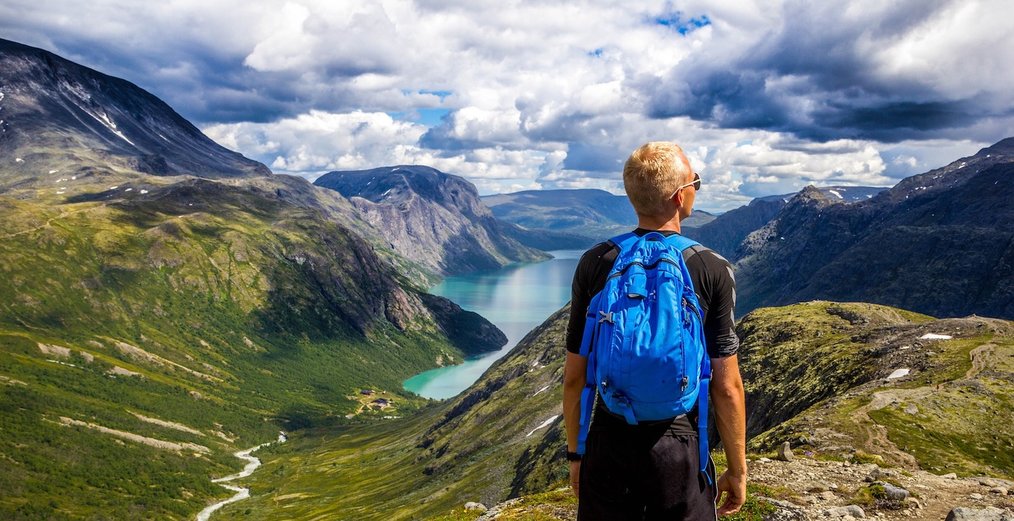
Learn a Little Norwegian
One of the huge perks about studying abroad in Norway is that English is ubiquitous, making it a relatively easy transition for native English speakers. However, that doesn't mean you shouldn't take the time to learn Norwegian. Most of the population speak Bokmål, which is likely what you'll learn should you pursue learning Norwegian.
Your university will typically offer a beginner's course in the language. I took a beginner's Norwegian course geared towards the University of Oslo's large international student body. I was able to take this class as an elective and would recommend you consider taking Norwegian as an elective as well. Even a basic understanding of a local language, or an obvious effort to learn, goes a long way in showing locals that you are seriously working on immersing yourself -- and will likely gain you respect among the community.
Dive into Norwegian Culture
In a sense, the Norwegians are going through a bit of a cultural renaissance. It's only recently that Norway moved out from under the heavy thumb of Danish and Swedish dominance in the region. For hundreds of years, Norway was a nation that was more or less a pawn in a larger game of world conquest. Nowadays, Norway has a thriving economy and a prominent seat on the world stage.
If you want to understand how far Norway has come, you need to take the time to understand from where they came. Taking the time to learn Norway's history made an enormous difference in how I understood the nation and its people. As with language, I made sure that I took an elective in Norwegian history in a class predominantly filled with international students. If that course isn't available, I'd recommend actively learning about Norway's history from the present back to the Vikings. (Who doesn't want to learn about the Vikings, right?)
Your education and immersion in Norwegian culture doesn't have to be just based in the classroom, either. When I wanted to learn more about the Vikings, I caught a bus to the Viking Ship Museum. There are outstanding museums aplenty across Norway which can help enrich your experience. Also, as with language, the Norwegians I met appreciated the time I put into learning about their homeland.
Get Out and Explore Norway
While this might sound self-evident, the number one piece of advice I'd go back and tell myself if I could do it over again is to actively experience your new home country!
I got so caught up in the rush of flying to see the big cities of Europe that, at times, I didn't focus enough on Norway itself. I've never actually stopped traveling since I lived in Norway; now, I've visited cities like Budapest, Vienna, and Prague multiple times. I wish I could say the same for cities like Bergen or Kristiansand.
I didn't really recognize it at the time, but Norway is quite out of the way of the European vacation path, so cherish your time exploring a nation like Norway. As I've become a more seasoned traveler, I'm even more convinced of just how special Norway is. Don't get distracted by larger nearby cities. Embrace Norway as much as you can.
Top Study Abroad Cities in Norway
There's absolutely nothing wrong with studying abroad in the great cities and well-trodden countries throughout Europe. However, there's also value in spending time in a quaint Scandinavian town or city that is almost sure to have access via the metro system to a ski hill (in the case of Oslo) or, at the very least, a place where you can learn to appreciate the outdoors and empty your mind of worry (in the case of every other city).
Norway has no shortage of intriguing university cities, but which one is right for you?
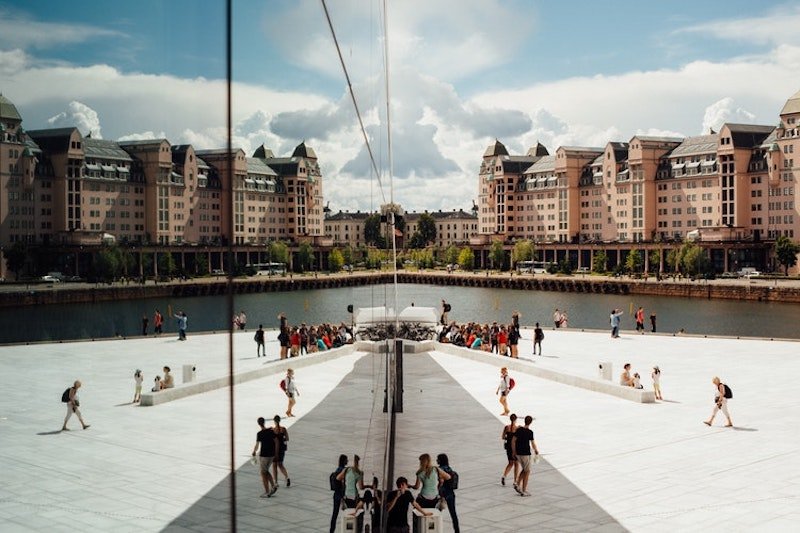
Best City for Those Looking for a Bit of Everything: Oslo
It's fair to say that Oslo would be the obvious choice when thinking of studying abroad in Norway. Oslo is the capital of Norway and by far its most populous city. Not to mention, Oslo is a great place to learn about the nation because of its density of quality museums and dedication to showcasing Norwegian history. The Viking Ship Museum is a gem for obvious reasons, and art lovers will surely love the Munch Museum, a museum dedicated to Edvard Munch, painter of the famed piece, "The Scream."
Beyond that, Oslo has an array of public spaces perfect for student enjoyment. Vigeland Park, the bizarre and intriguing sculpture park, is an excellent place to enjoy a picnic with a few new friends. Oslo, by nature of being the capital, also has a large international student body, which can help make your time there enjoyable.
Lastly, Oslo has no shortage of concerts rolling through the city from a reputable array of artists. Cities farther north certainly have their charm and appeal, but you're not quite as likely to get the big names in music to make the journey up.
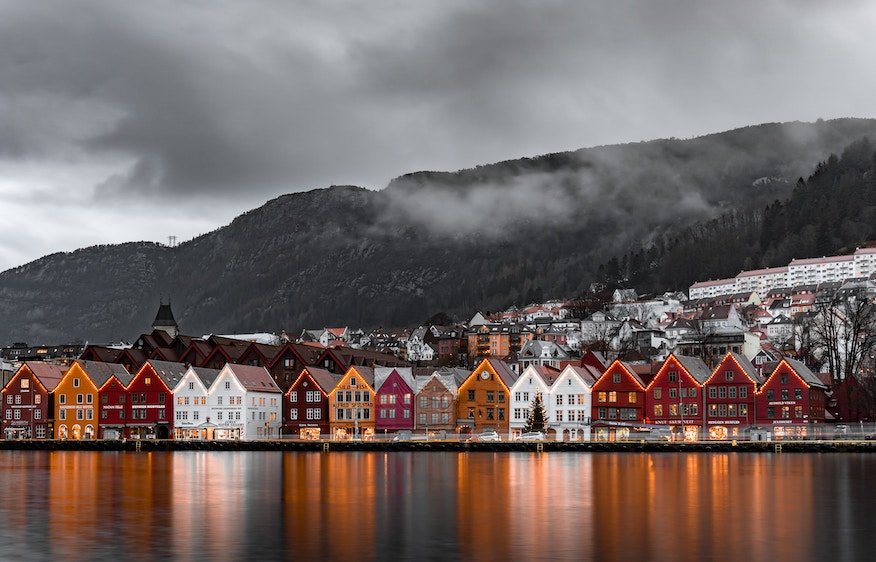
Best City for Outdoor Recreation: Bergen
Bergen is the second-largest city in Norway, but many contend that it's Norway's most beautiful. In many ways, Bergen is the city you're picturing when you imagine Norway. The city is politely nestled into a mountain range, and a fair portion of the city is actually on a fjord (which, for those who don't know, is a large, deep body of water between cliffs, in what would long ago have been a glacial area).
Bergen is in part known for its enterprise in shipping and oil, but, naturally, that's not what makes it a perfect university city. When I lived in Oslo, I had a slew of friends who lived in Bergen, and they loved what an outdoorsy town it was in all seasons. Bergen is widely referred to as the "city among seven mountains," so you can imagine what sort of opportunities there are for those who love to be in nature, especially hikers.
Beyond just nature, Bergen happens to be stunning, which makes it a photographer's paradise, especially since aerial views aren't hard to come by thanks to the nearby mountains.
You can also imagine what it'd be like to attend a school in a city with a restored medieval wharf (known as Bryggen). When you're in Bryggen, don't forget to stop by the museum, commemorating Bergen's time as an official bureau city of the Hanseatic League (The Hanseatic Museum and Schøtstuene).
If Oslo is a bit too big, but you still want to attend a school in a sizeable city, Bergen is a good bet!
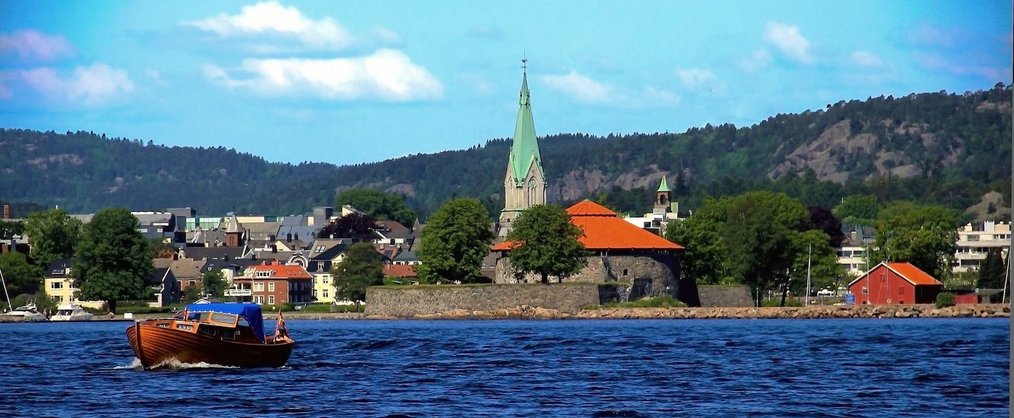
Best City for Live Music Lovers: Kristiansand
It's the fifth-largest city in Norway, but many Norwegians would say that it deserves to be in the talks for the top university city in the country. This is largely because the population is under 100,000, but nearly a tenth of them are university students.
Kristiansand is also known for its harbor and natural beauty but also has one of the top zoos in the country and an amusement park that isn't all that far away from the city. It doesn't get much better than Fiskebryyga, the old fish landing, with plenty of colorful houses nearby to make it that extra level of picturesque.
Students also love that it has become a bit of a hotbed for music and concerts, with a world-class performing center and plenty of venues that love hosting and promoting music in the city. It won't necessarily have the international student body you could find in other cities, but the Norwegians are highly proficient in English, so perhaps that's just what you're looking for!
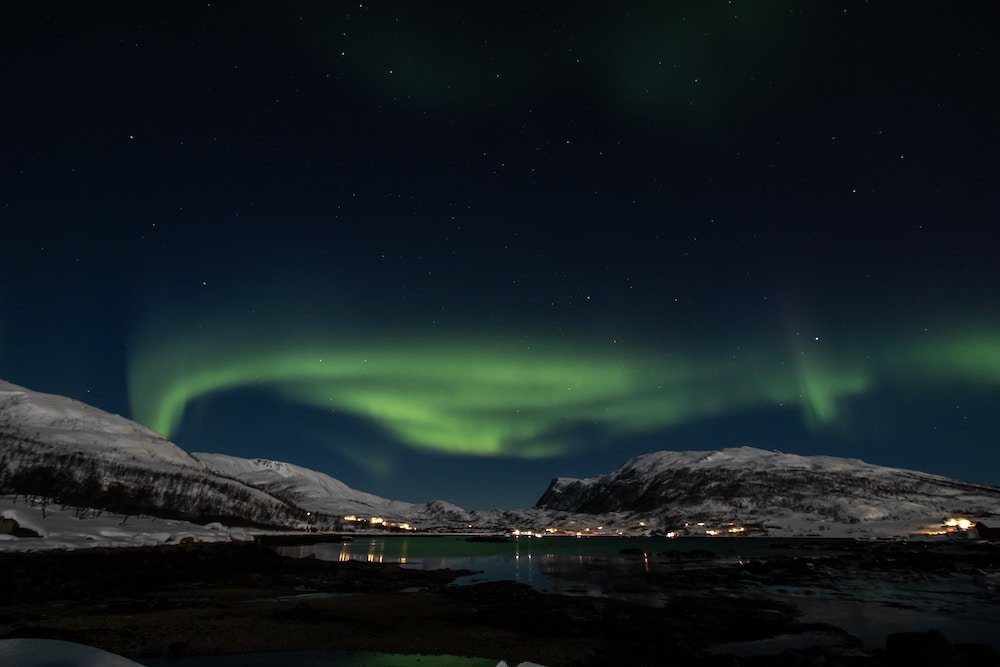
Best City for Those Chasing the Northern Lights: Tromso
Tromsø is the city that you should study in if you're looking to get a feel for what it's like to live in northern Norway. Geographically speaking, you can't go that much further north than northern Norway. Tromsø is the third-largest city north of the Article Circle in the world. If that's not an intriguing place to go overseas and study, I don't know what is.
The city has a population of just under 70,000 people, and it's really the city in this region. The major sites reflect its latitude, with Polaria, an arctic aquarium, and The Polar Museum both being significant attractions.
When I was attending school in Oslo, I had friends studying in Tromsø, and they constantly stressed that, while it didn't have all the bells and whistles of Oslo, studying in Tromsø felt like a once in a lifetime opportunity. I'll also tell you that while the northern lights were shining bright in Tromsø, I was more than a little jealous.
If you're looking for something a little different with a strong academic background and university heritage, then Tromsø might be your best bet.

Best City for History Buffs: Trondheim
While this likely is not a city you've heard of prior to reading this article, it's a very well-known city in Norway, and that's largely because of its prominent technology and science-oriented institutions. It also happens to be the third-largest city in Norway.
It's been an important city for quite some time, and as such, it's a great place to be if you're someone who loves history. Nidaros Cathedral, for example, is an 11th-century gothic cathedral that many in Norway feel is one of the countries most beautiful.
It's also a great place to be if you're a music lover and are particularly interested in experiencing Norway's musical history a little further. For one, great bands swing through here regularly (especially top Norwegian artists), and Trondheim houses the Rockheim, a museum dedicated to showcasing Norwegian popular music.
This is an excellent spot for students looking to dive into Norwegian culture from several angles while receiving a top-notch education at the same time.
The Top Study Abroad Programs in Norway
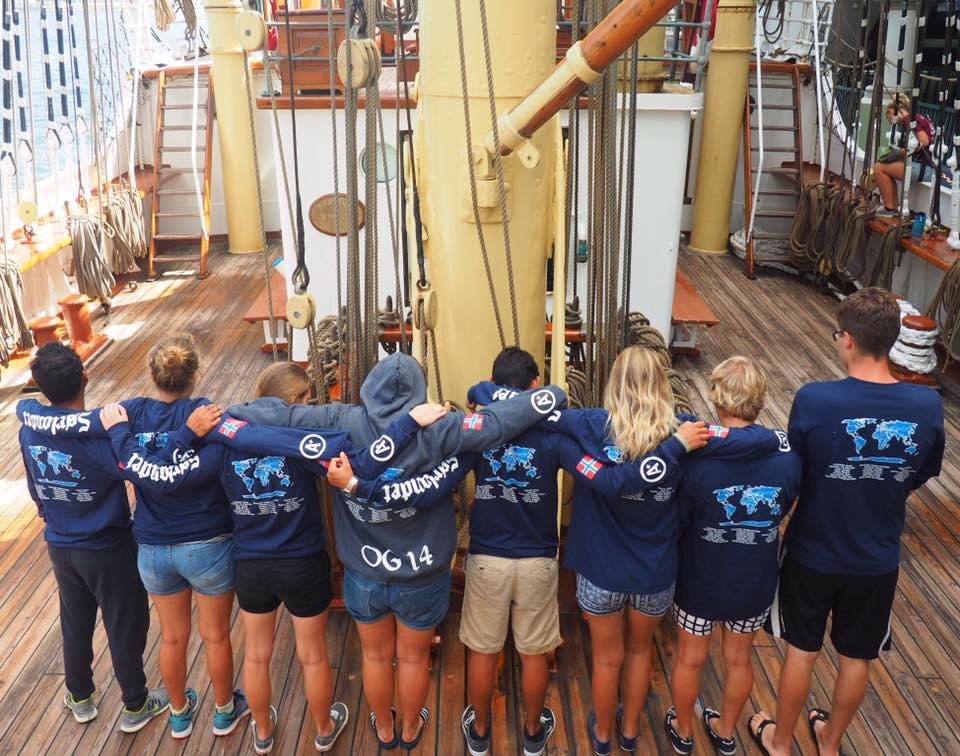
Choosing which study abroad program in Norway is correct for you depends on a variety of factors. The academic program itself is obviously going to have a significant bearing on your decision. You'll also be considering what your housing situation will be like, what fun you might be able to get into, and overall safety. One benefit to studying abroad in a place like Norway is how safe and peaceful it is.
Each program in Norway will have its strengths, some of which might genuinely speak to you. I appreciated the strong academics at the University of Oslo and the opportunity to learn more about Norwegian literature from some of Norway's top professors. That being said, my past decision isn't the same as your future decision, so it's worth taking the time to carefully examine the following programs and where you feel you'll find the best fit.
I also want to briefly stipulate that you won't necessarily ever find the "perfect fit." It's about appreciating what makes a place special and accepting that you might find certain aspects of a place difficult to digest at first. Having lived on five different continents, I can tell you that the number one factor in your success is your attitude. You can find faults in the best situation and beauty in a difficult one.
Below are the top study abroad programs in Norway for you to consider.
American College of Norway
Over and over again, students tout the American College of Norway for its "small school feel" that makes for an intimate educational experience. This is a unique experience as the school is situated in Moss, Norway, a medium-sized coastal town in the northwest of the nation. Studies are conducted in English, and classes often have a mixture of both international students and Norwegian students, which many students appreciated. The school offers fall semester, spring semester, a full year, or summer courses.
Program Details
University of Oslo: International Summer School
At the University of Oslo, you'll be enrolled at one of Norway's most prestigious universities, as well as the oldest. With this program, in particular, students appeared to be very impressed with the efforts the University went to organize trips that would allow students to get a better grasp on the city and nation, but also in promoting the social aspects of such an experience. While I certainly don't want to offer too much of my own bias into this, I will say that I do concur with the above statements. I very much enjoyed my time in Oslo, and the summer is a perfect time to visit because of the long days.
Program Details
HECUA: The New Norway
For those not aware, HECUA stands for the Higher Education Consortium for Urban Affairs. HECUA is, in short, a collection of colleges, universities, and associations which are focused on social justice. This program in particular aims to highlight Norway's political and social challenges as their population continues to change in the face of mass immigration, asylum seekers, and refugees.
Program Details
USAC Norway: Oslo
USAC stands for the University Studies Abroad Consortium, and this particular program is run at the University of Oslo. One major benefit of this program is the wide array of courses that are offered in English, which means that students from a variety of majors can actively fulfill their degree requirements. Students taking part in this program were pleasantly surprised by the beauty of Oslo, especially its wide boulevards, as well as the proximity of Oslo to outdoor experiences like skiing and hiking.
Program Details
How Much Does it Cost to Study Abroad in Norway?

Studying abroad in Norway comes with a significant financial cost (though not necessarily when it comes to tuition). There are certainly ways to be economical as a student, but these won't negate the fact that Norway is one of the most expensive countries in the world.
That being said, if you're mindful of spending when eating out and at bars and pubs, it becomes more affordable -- but be prepared to be a little more money-conscious! It's also worth noting that if you're attending a public institution in certain circumstances, your tuition could be significantly lower than elsewhere (or even free).
Let's dive into that further.
Average Tuition Cost For a Semester in Norway
You'll have noted by now that daily spending and life can be expensive, but how much is tuition, again?
Almost all public institutions in Norway offer free education to local and international students. This includes prestigious institutions like the University of Oslo, the University of Stavanger, the University of Bergen, and other well-regarded public institutions. However, I know that when I enrolled in my third year of study at the University of Oslo, I was still required to pay my tuition to my home institution. I can't speak for how all institutions run their exchange programs, but it's worth understanding that your year on exchange might not be free regardless of the cost of the Norwegian university. Additionally, while public universities might be free, private institutions are not. Students can expect to pay anywhere from USD 5000 - 10,000 per year for tuition at private institutions in Norway.
Average Cost of Living in Norway
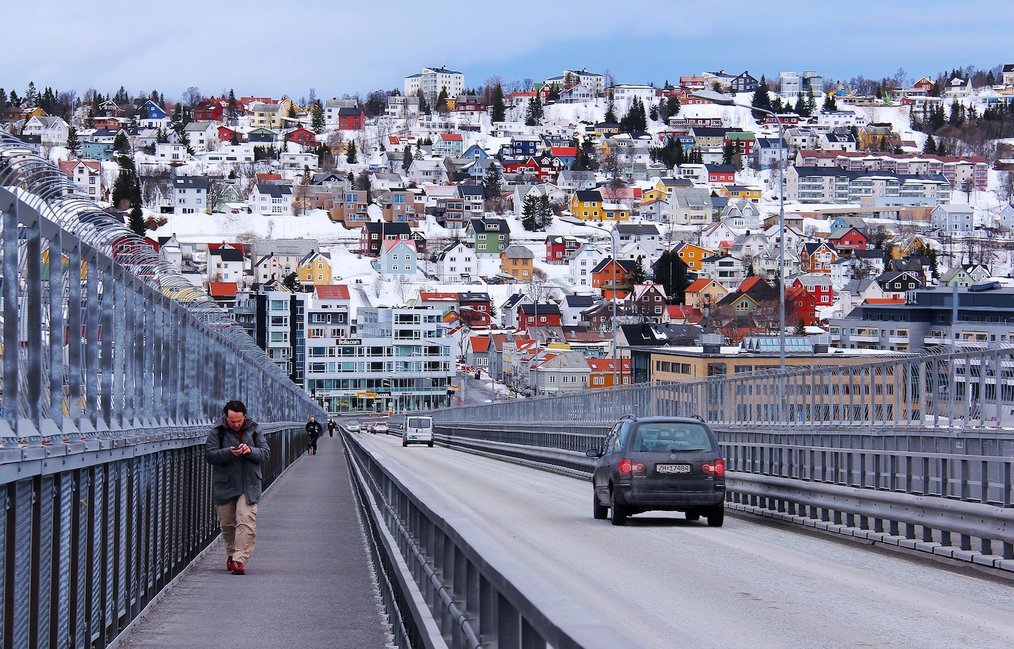
There's a good chance that Norway will be more expensive than wherever you're coming from. At first, I was taken aback by the cost of everyday things, particularly eating out, but you do get used to it and find ways around it. I spent more time in less affluent areas and tried to scope out local places to get food on the fly.
Naturally, different cities in the country are going to come with a different price tag, but note that the drop-off isn't significant. As a nation, Norway tends to be expensive, but Oslo is the most pricey overall. Bergen, Trondheim, Stavanger, and other cities are all very expensive as well.
One thing to consider when choosing where to study in Norway is that some communities may have more expensive goods due to their isolation.
According to Numbeo, here are the average costs for the following, all of which you'll need to consider when living abroad:
| EXPENSE | ESTIMATED COST |
|---|---|
| Meals | $20.07 - inexpensive meal $89.20 - three course meal at a mid range restaurant $13.38 - McDonald's meal |
| Monthly Rent | $1,126.35 - 1 bedroom in the city centre $884.71 - 1 bedroom outside the city centre $1834.35 - 3 bedroom in the city centre $1426.70 - 3 bedroom outside the city centre |
| Utlities | $187.05 - basic utilities for a 915 square foot apartment $55.94 - high quality internet costs |
| Transportation | $4.24 - one way ticket on the metro $85.85 - monthly metro pass $11.15 - starting price for taxis, with additional $2.57 for each mile after that. $6.74 - a gallon of gas |
| Personal Expenses | $10.03 - domestic pint of beer $16.72 - mid-range bottle of wine $4.73 - regular cappuccino $46.37 - monthly gym membership $97.35 - pair of jeans $14.49 - ticket to the movies |
It's difficult to say how much you should budget for because, in Norway, your cost of living is so dependent upon how much you decide to eat and drink outside of your respective accommodation. Rent, in general, isn't horrific, but daily life is going to come with a cost. One big way to save money is on groceries, and I found watching for daily and weekly deals at the grocery store REMA 1000 saved me a lot of money.
Average Airfare & Travel Costs While in Norway
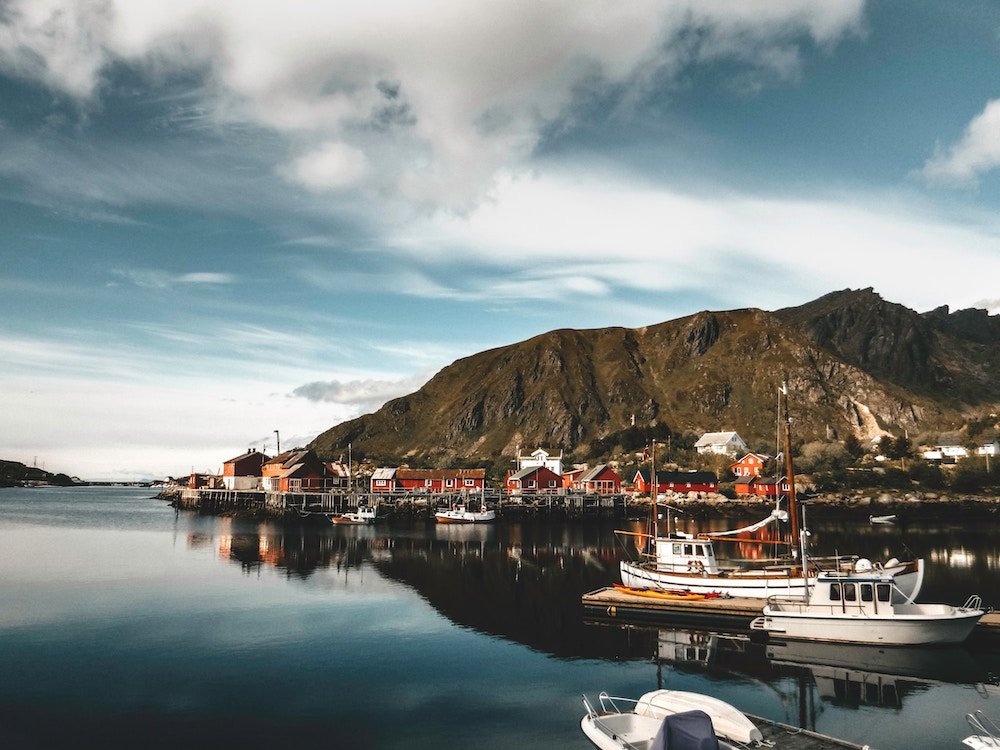
When flying from the United States, you will more than likely be arriving in Oslo, the largest city and hub of the country. If you're flying from a major American city to Oslo, you should expect to pay around $1000 for lower-cost airlines and $1500 and higher for anything above a budget airline. Prices will vary from city to city, but that's what you should expect to see from a central hub like New York.
Flying within the country is much more reasonable, especially since the emergence of Norwegian Air. Flying from Oslo to Bergen will cost you $200 or less. Taking the train is also lovely in Norway as you get to take in all the scenery around you, and road trips are a lot of fun, as long as you're splitting the costs with several people. Remember, gas can add up pretty quickly.
Many low-cost airlines fly in and out of Oslo, so flying to major cities around Europe isn't that much more expensive than traveling within the country. A flight to Rome, for example, might cost you $325 with Norwegian Air. Using a service like Skyscanner to gauge flight prices helps find deals, and you can even set up a flight alert to places you're interested in visiting. That said, the first thing that I'd do would be to become a member of Norwegian Air and take advantage of their deals and sales whenever possible.
Is it Worth it to Study in Norway?
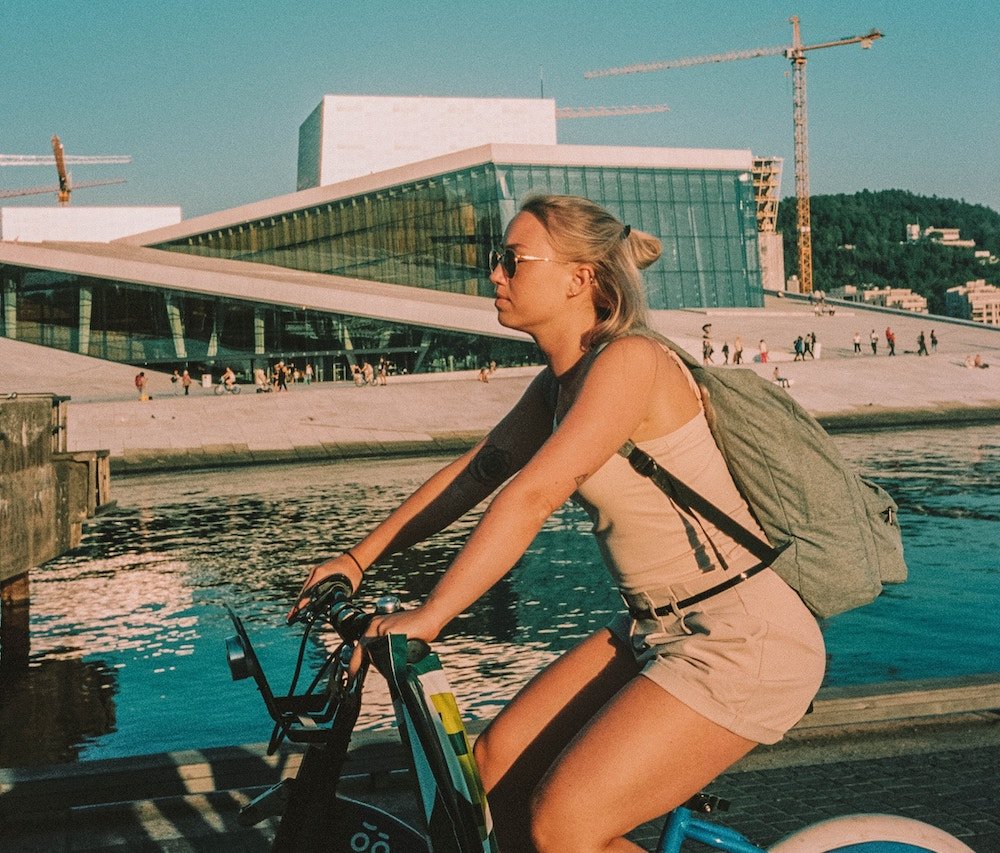
Norway is expensive, but it's also so much more. For those looking for access to the outdoors, you'll likely spend more than you've ever spent outside here and, like the Norwegians, live to breathe fresh air and be in nature. Newsflash - a hike won't cost you a thing except for a packed lunch.
Studying in Norway changed my life, plain and simple. I credit living in Norway with a lot of what I've internalized as far as my desire to be in nature and strike a fair work/life balance despite now living in ever-busy North America.
Studying abroad Norway is a truly unique opportunity, and not something everyone can say they've done. There's truly only one Norway and, if you're willing, this beautiful ready and waiting for you to arrive at its shores.





